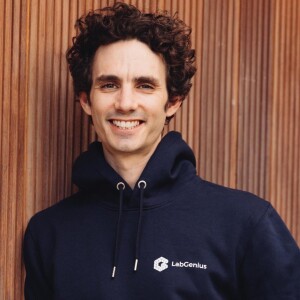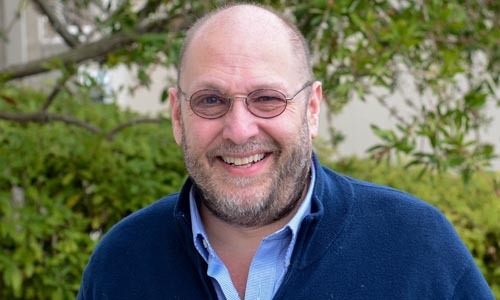Episodes

Wednesday Oct 11, 2023
Using AI to Generate Mini-Protein Therapeutics
Wednesday Oct 11, 2023
Wednesday Oct 11, 2023
Mini-proteins have the power and performance of an antibody with the ability to bind tightly to a target. But because of their small size, it can penetrate into places where small molecules can go. Ordaōs Bio is leveraging its generative AI platform to develop a pipeline of mini-protein therapeutics. We spoke to David Longo, co-founder and CEO of Ordaōs, about the company’s focus on mini-proteins, its generative AI platform, and why its building its own pipeline around rare disease indications and partnering with other drug developers on other indications.

Wednesday Oct 04, 2023
Inhibiting Cell Death to Preserve Vision in Retinal Diseases
Wednesday Oct 04, 2023
Wednesday Oct 04, 2023
The Fas signaling pathway plays a central role in activating cell death. As such, it is implicated in a range of conditions and has been associated with ophthalmic diseases. ONL Therapeutics is developing therapies that target Fas signaling to address a range of retinal conditions. We spoke to Connie Chang, chief operating officer for ONL Therapeutics, about the role Fas-signaling plays in cell death, how this underlies a number of retinal diseases, and the company’s experimental therapy to inhibit Fas signaling.

Wednesday Sep 27, 2023
Leveraging Generative AI to Design Therapeutic Antibodies
Wednesday Sep 27, 2023
Wednesday Sep 27, 2023
Antibody discovery is a long, costly, and complex process. LabGenius is reinventing that process by using its platform technology that combines AI with robotic systems capable of designing, conducting, and learning from its own experiments. Its platform not only has the potential to accelerate the drug discovery process but can generate high-performing molecules that likely would not have been found through conventional discovery methods. We spoke to James Field, founder and CEO of LabGenius, about the company’s use of generative AI to discover new therapeutic antibodies, its initial focus on immunotherapies, why he thinks the data the company is generating to train its AI system is a significant point of differentiation.

Wednesday Sep 20, 2023
Managing Pain without Addiction
Wednesday Sep 20, 2023
Wednesday Sep 20, 2023
Opioid overdose, abuse, and addiction affect an estimated 3 million Americans and accounts for $35 billion in U.S. healthcare costs every year. Tris Pharma is developing the opioid Cebranopadol, as an effective pain management therapy without the addictive potential of FDA-approved opioids. We spoke to Ketan Mehta, founder and CEO of Tris Pharma, about Cebranopadol, how it modulates the addictive potential by targeting two receptors at once, and its potential to address the opioid crisis. An editor’s note: since recording this podcast, the National Institute on Drug Abuse, part of the National Institutes of Health, awarded Tris a five-year, $16.6 million grant to advance Cebranopadol.

Wednesday Sep 13, 2023
Using AI to Match Cancer Patients to their Best Treatment Options
Wednesday Sep 13, 2023
Wednesday Sep 13, 2023
With the rapid advances in cancer research, it can be difficult for physicians to stay on top of all of the emerging treatments in clinical development. Leal Health has developed an AI-powered platform that provides a personalized list of treatment options to match a patient’s precise diagnosis to advanced therapies in clinical testing. We spoke to Tzvia Bader, co-founder and CEO of Leal Health, about her own experience with cancer, how that led to the creation of Leal Health, and how it is harnessing AI to connect patients to clinical trials based on their exact diagnoses.

Wednesday Sep 06, 2023
A Venture Capitalist’s View of the Current Biotech Landscape
Wednesday Sep 06, 2023
Wednesday Sep 06, 2023
Earlier this year, the venture capital firm SR One closed a $600 million fund, its second since spinning out from the pharmaceutical giant GSK. Despite the difficult investment landscape today for biotechs, it’s a reminder that significant capital is available to be deployed. We spoke to Simeon George, CEO and managing partner for SR One, about the firm’s investment approach, how the current landscape is causing venture capitalists and therapeutics developers to think differently, and what advice he’d offer entrepreneurs seeking to raise money today.

Wednesday Aug 30, 2023
Realizing the Therapeutic Potential of Cytokines by Making them Context Dependent
Wednesday Aug 30, 2023
Wednesday Aug 30, 2023
Cytokines, which play an essential role in immune cell signaling, have long been recognized as having great therapeutic potential, but efforts to harness them have been hampered by their toxicity. Bonum Therapeutics is overcoming this limitation by engineering cytokines with a sensor domain that makes their activity dependent on their environment. While the company is focusing its efforts to develop regulated cytokine to treat cancer, it also has potential as an approach to autoimmune, metabolic, and other conditions. We spoke to Bonum Therapeutics Chief Scientific Officer Diane Hollenbaugh and Bonum Chief Business Officer Neela Patel about the therapeutic potential of cytokines, the challenges of using them as therapeutics, and why Bonum’s context-dependent cytokines may enable wider use of these proteins to treat a range of diseases

Wednesday Aug 23, 2023
Targeting Cancer and Autoimmune Conditions with Donor-Derived EBV T Cells
Wednesday Aug 23, 2023
Wednesday Aug 23, 2023
The Epstein-Barr virus is among the most common viruses associated diseases including multiple sclerosis and certain cancers. Atara Biotherapeutics is developing off-the-shelf, T-cell immunotherapies designed to target cancers and autoimmune conditions driven by the Epstein-Barr virus. It is also using its EBV T-cell platform to develop next-generation allogenic CAR T therapies to target a range of non-EBV associated diseases. We spoke to Pascal Touchon, president and CEO of Atara, about the role of the Epstein-Barr virus in certain cancers and autoimmune conditions, the company’s platform technology for allogenic CAR T therapies, and why it has implications beyond EBV-driven diseases.

Daniel Levine
Daniel Levine is an award-winning business journalist who has reported on the life sciences, economic development, and business policy issues throughout his career. He is founder and principal of Levine Media Group, host of The Bio Report and RARECast podcasts, a senior fellow at the Center for Medicine in the Public Interest, and author of Global Genes’ annual NEXT report on emerging trends in the world of rare disease. From 2011 to 2014, he served as the lead editor and writer of Burrill & Company’s acclaimed annual book on the biotech industry. His work has appeared in numerous national publications including The New York Times, The Industry Standard, and TheStreet.com.

